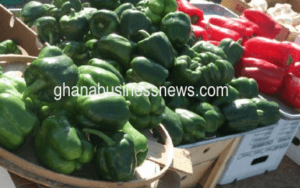EU ban on vegetables from Ghana still in force
 Mr Christian Peters, the Head of Economic and Trade Section of the Delegation of European Union (EU), says the ban of five groups of vegetables from Ghana to the EU market is still in force.
Mr Christian Peters, the Head of Economic and Trade Section of the Delegation of European Union (EU), says the ban of five groups of vegetables from Ghana to the EU market is still in force.
He said the ban was to ensure that the country abides by international regulations and standards with regards to such perishable goods.
At a day’s workshop on the Trade Related Assistance and Quality Enabling (TRAQUE) programme for private companies and business organisations on how to export to the EU market, Mr Peters said currently, Ghana does not export pepper, bottle gourd, luffa gourd, bitter gourd and Aubergines to the EU market due to an audit, which proved pest infestation on such vegetables.
The Trade Leader however said: “There will be an audit in September by the European Commission; if results are positive, the ban will be lifted from January 1, 2017.”
The Ministry of Food and Agriculture in September last year, announced a temporary ban on exports of the five vegetable to the EU market until all issues on interception by the Food and Vegetable Office (FVO) of the European Commission, are addressed.
Mr Peters said the Economic Partnership Agreement (EPA) between ECOWAS and the EU would provide Ghanaian businesses with tariffs preferences and better competitive position on EU and regional markets.
The TRAQUE initiative forms part of the efforts to improve trade related capacity towards a successful implementation of trade agreements like the EPA,.
It had supported the strategy to help Ghana take full advantage of EPA and become competitive in international trade.
Mr Peters noted that capacity of the Custom Division of the Ghana Revenue Authority would be enhanced to apply the rules of origin as stated in the EPA.
The European Investment Bank, is supporting Ghanaian SMEs with 80 million Euros on lending facility.
Others projects to improve trade include: regional trade policy, quality infrastructure, trade facilitation and investment climate valued at 40 million Euros.
Mr Ebenezer Padi Adjirackor, the Director of Policy Planning, Monitoring and Evaluation at the Ministry of Trade and Industries, said removing Regional and National barriers is key to ensure trade facilitation among countries.
He said there are challenges facing Ghanaian exporters and eligible companies in the EU market, which requires technical and financial assistance.
He said it is the responsibility of the government to create the enabling environment for the private sector to become competitive globally.
Mr Adjirackor said it is important therefore to tease out critical concerns that are hampering effective international trade and the necessary actions taken to solve the situation.
He noted that the -sub region is moving at a snail pace with regards to free movement of people, goods and services, which reveals a lack of commitment on the part of heads of state to implement the various protocols.
Source: GNA
